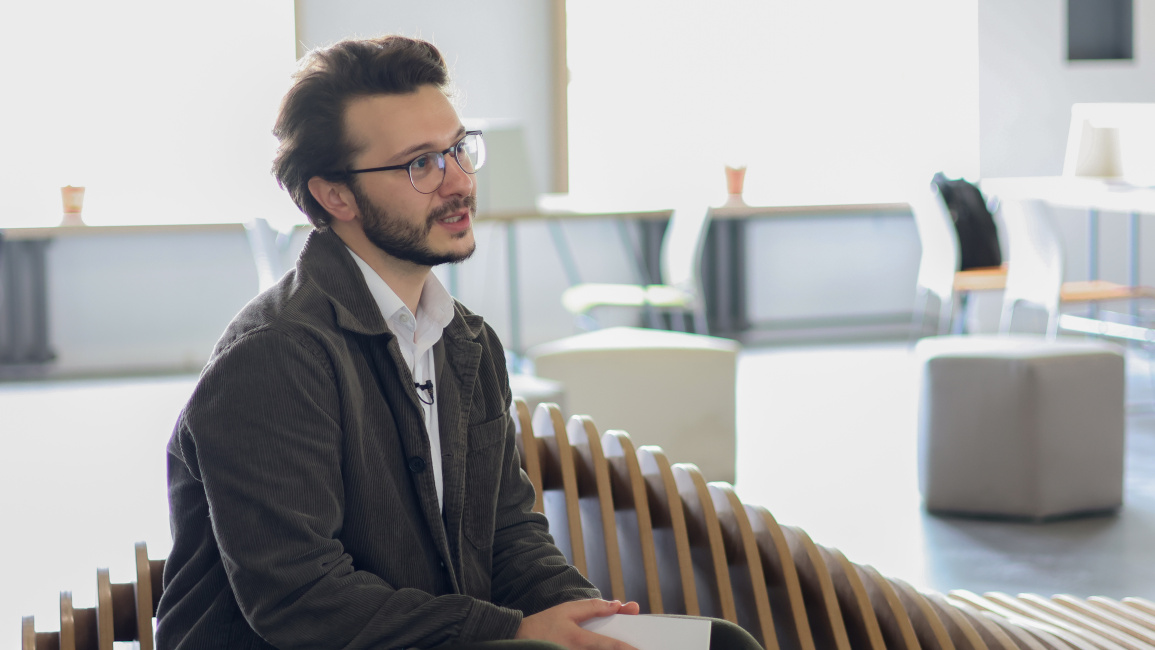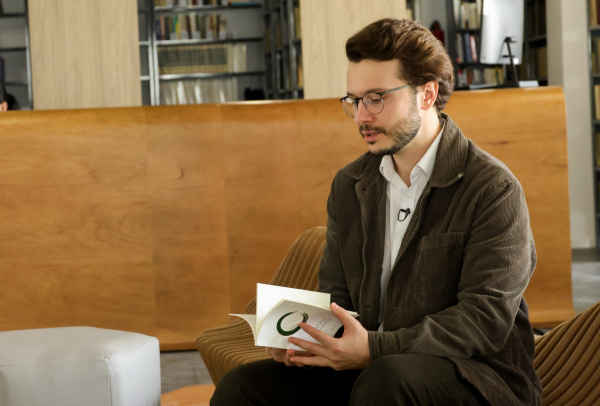September 29, 2025 | 11:17
Education
Society
From YSU student to graduate and lecturer: Hamlet Arakelyan’s professional and literary path
"Yerevan State University taught me how to think," says Hamlet Arakelyan, whose professional journey began at this university. It was here that he was shaped into a lecturer, TV host, writer, and reflective thinker well-known in media. A young man who lives and creates in the world of text, he views the university as a school of thought, and text as the foundation of public life. Between Hamlet's words and silence, new values are constructed—in the auditorium, on stage, on screen, within the pages of books, and across social media platforms.

– Why did you choose Yerevan State University specifically? Who or what influenced that decision?
– My mother has been a lecturer at YSU for nearly 30 years, teaching at the Faculty of European Languages and Communication. I grew up hearing stories about the Chair of English Philology and its lecturers—individuals I later encountered as a student myself. I have always been fascinated by texts—whether in literature or media—so the choice of my field of study was quite clear. I enrolled in the "Cross-Cultural Communication" bachelor's program. I continued my education in the master’s program, focusing on foreign literature, and later pursued my PhD studies at the Chair of English Philology, researching the language of media.
– How did your education at YSU, from bachelor's to PhD studies, shape your professional path?
– Everything I studied at YSU—particularly in our faculty—was directly related to text. I perceive the world as a text, and my worldview is formed through textual interpretation. Over the years, the angles from which I have approached texts have shifted: at first, I explored cultural issues, then literary criticism, and later, media and communication. Yet, at the core of it all lies the text.
To me, text, words, and language are the foundation of everything. We communicate, succeed, or perhaps even fail—through text and words. For me, text is not only the foundation of my life but also of my education. Therefore, throughout my professional development, I acquired the skills to fully comprehend text and, eventually, to create impactful texts. These essential skills were gained at the university, and now I pass them on to my students.
– In your opinion, how has Yerevan State University changed over the years?
– Since I have spent at least ten of the thirty years of my life here, I can certainly say that the university has become a kind of home to me. And when it comes to a home, it is not external or superficial changes that alter your feelings. That is why I remain deeply subjective about YSU—just as anyone would be about their own home.
Nevertheless, the improvements to the university’s facilities are undeniable. When we were students, the conditions were very different from what they are today. As for reforms, methodology, adapting to the demands of the times, and other aspects, I believe the changes are clearly evident.
– Are there any incidents, stories, or perhaps memories related to YSU that you haven’t talked about yet but would like to share now?
– My memories of YSU are closely tied to knowledge. We had professors whose lectures were very important to us. I could skip work or miss other important events in my life, but I always made sure to attend classes. More than that, we had professors whose lectures we recorded because they were so valuable that we wanted to listen to them again. In this context, I would like to mention my beloved professor Sergey Stepanyan, who taught us Rilke and German poetry. We even still have some of those recordings to this day.
– Hamlet, what did Yerevan State University give you, and what experiences and knowledge did it provide that helped you move forward in life and develop your thinking?

– Yerevan State University taught me how to think. I believe one of the main goals of any academic process is precisely that: learning how to think. I remember during my second year, when I was going through a very difficult semester, one of our late lecturers, Gayane Girunyan, who taught lexicology, saw my distressed face and said, "I know it’s going to be hard, but the most important thing the university will give you is that you will learn to think here, and all doors open for a thinking person." I will never forget this brief conversation, and now I tell the same to my students.
– How did that way of thinking and the knowledge you gained help you continue your work, especially in the world of television? How did your academic and practical experiences complement each other?
– At the core of television is, once again, text. I don’t consider my two paths—academic and professional, which began before I came to YSU—as separate. I believe they complement each other. After all, it was at YSU where I learned how to make speech more impactful, and television is also about speech.
– Literature holds a special place in your life. You began your literary path by writing novellas and poetry collections. When and what internal or external motivations "compelled" you to create and publish Tantric and How Sad Though? Could you tell us about that?
– I started writing when I was 13 or 14 years old. I wrote my first poem in English at the age of 14, although I wouldn’t consider it a poem now, even though at the time I was much more confident. In short, writing has always been a part of me. Naturally, over the years, working with language, learning, and reading an enormous number of books and literature refine a person as a writer—texts become more polished than they once were. Tantric is a confession about the search for identity, the relationship with oneself, and inner experiences that try to be transformed into words.
– In How Sad Though, you use the symbol of absence—words, transitions, even entire sentences are deleted or omitted. What kind of relationship did you want to convey through this form?
– The reader becomes part of the poem through their response and thoughts because, in any case, it’s a process that doesn’t end the moment the book is published, but continues as soon as the book is in the reader’s hands. Sometimes, the unspoken, unwritten, or written-and-deleted lines can mean more than what is actually said.
– Let’s also talk a bit about Academy of the Immortals, a fantasy novel much loved by readers. It is one of the notable works of contemporary Armenian literature, and you spent seven years working on it. The book received considerable attention. How did the idea of writing a fantasy novel come about?
– I started writing Academy of the Immortals during my first and second years at YSU. At first, it was just a straightforward story without any fantasy elements. The book is about two young men studying at Yerevan University—which is now YSU—and their experiences. The problems I wanted to address in the novel and the characters’ journey later required fantasy elements, as it wouldn’t have been possible to present them otherwise. That’s when the idea was born to turn this story into a fantasy novel, enriching it with elements of the fantasy genre as a means to solve the challenges faced by the characters.
– What do you think made the book so phenomenal and timeless?
– In some ways, the book was fresh both as a genre and as a fantasy novel, since fantasy is quite rare in our reality. I believe we love reading heroic stories, especially those about education, academia, and teachers. People are always looking for guidance in life, and if there’s a book that offers many guides and also choices, it probably gets read more.
I can’t really answer what the path to immortality is, as I might spoil it for those who haven’t read the book yet. But I can say that my own path to immortality, as shown in the book, began at YSU — it is a path toward enlightenment and the personal understanding of that path that each person has for themselves.
– Hamlet, years later, you’re now at the university as a lecturer. What kind of experience is that for you? Which values and principles do you prioritize in your work?
– I've been teaching for three years now. Together with my students, we explore everything related to English-language media—the language of media, and the relationship between media and society. For me, stepping into an auditorium is a profound pleasure, because it is a space where I can share my experience and knowledge with people in a real and meaningful way.
I'm a strict, demanding, yet kind lecturer. Strict and demanding—because I value the academic process and believe that education plays a significant role in shaping a person. That’s why I do my best to approach the teaching process with the utmost responsibility. And kind—because the primary goal of any educator is to help shape good citizens and thinking individuals. That’s the mission I carry with me into every auditorium.
– You also speak about important values—love, care, loyalty, faith, and hope—across various social media platforms. What place do these values hold in your own life?
– I speak about these values on social media because it's the simplest and fastest way to make certain messages heard. I try to talk about things that are simple and true—things we often overlook.
The flow of information is so overwhelming today that I believe everyone needs moments of silence or reflection, and I try to provide that. I want my posts to interrupt the stream and activate thought, because when we stop thinking, we go with the flow. And that, for me, is not an acceptable way to live.
A person always consumes what they are in need of...
– And one last question, Hamlet. What is the key to your success?
– To love life in all its forms... And to believe that if what I’m doing carries a mission greater than just my own desires, then it will surely come to pass.
Video

